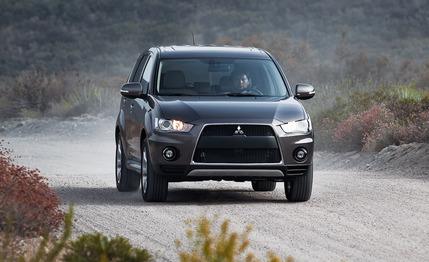 Short Take Road Test
Short Take Road Test
Does the world need a family-oriented, five-door crossover with a “tarmac” setting? We’re about to find out with the 2010 Mitsubishi Outlander GT.

What is tarmac? It’s what European rally pilotes who eat quiche and walk on the balls of their feet call asphalt. Blacktop, in other words. Mitsubishi is known for making hellacious rally cars, although not lately, as the factory has withdrawn from rallying due to a cash crunch. Even so, the halo of the mighty Lancer Evolution series of race machines shines on the entire product line, so now the Outlander GT has a “tarmac” drive setting.
Smarter than the Average Differential
For another $2860 above the price of an all-wheel-drive Outlander XLS ($27,130, base), the $29,990 Outlander GT adds a sunroof and a 710-watt Rockford Fosgate thumper stereo with a 10-inch subwoofer in the trunk (a navigation system is optional on the GT), plus S-AWC, or Super All-Wheel Control. That last bit is Japanese hyperbole for an electronic front differential that senses driver inputs, vehicle attitude, and wheel slip to vary engine torque to either of the front wheels with an electronically controlled clutch pack.
What does all that mean? The Outlander GT steers sharper in tight corners, because when the inside front wheel loses traction, the computer directs more torque to the outside wheel to help turn the car. The rear axle, meanwhile, also gets torque sent to it via the car’s all-wheel-drive system.
It all works well, giving the Outlander more steering confidence in fast turns and a better sense of control, if fast turns are places you like to go. If not, know that the GT is going to steer you in the right direction if you overdo it on a freeway on-ramp or are feeling frisky during morning rush hour. When the weather turns foul, you can switch the system from “tarmac” to “snow” with a three-position dial on the center console. It makes S-AWC more circumspect about spreading torque around for the best traction in the slippery stuff. You can also lock the Outlander in four-wheel drive at low speeds for extracting the car from especially sticky (or snowy) situations.
Not an Evolution Crossover
Like the XLS, the GT gets a 10-hp upgrade to its 3.0 liter V-6 for 2010, now making 230 hp. Shifting the six-speed automatic (base 2.4-liter models get a new continuously variable transmission) with the column-mounted paddles, we managed to hit 60 mph in 7.5 seconds, which is toward the quicker end of the class. Mitsubishi could have gone farther. The GT doesn’t have the company’s new six-speed, dual-clutch automated-manual transmission used in the Lancer Ralliart and Evolution or a power upgrade compared with the cushier Outlander XLS model. It could have made a real Evo crossover with 20-inch rims and the equivalent of iron poles for shock absorbers—but it didn’t. That’s probably a good thing. The price would have been deep into $30,000 and buyers would have been scarce.
The GT’s ride is definitely on the sporty side, but it’s still compliant and won’t make children cry or spill their ice cream. Unlike an Evo, the cabin has decent sound isolation from tire noise and road thunks. In other words, although it wears a GT badge, the Outlander’s go-fast tuning hasn’t gone off the deep end for people who are only casually sporty.
The Little Things
Mitsubishi has also refined the exterior styling to be more, er, EVO-cative. The grille opening is now a massive inverted-keystone shape like the Lancer’s; the look was previewed by the Outlander GT Prototype concept and is a definite improvement.
Inside, Mitsubishi has spruced up the materials and displays on all models, but the GT benefits the most with French-accent stitching on the leather seats and dash pad and widely employed soft-touch materials. The cheap-looking red digital information display between the gauges is gone, replaced by a high-definition, multicolor LCD that definitely ups the Outlander’s premium feel. Everywhere you look there are improvements in materials quality, texture, and execution.
The S-AWC system is the sort of high-end technology gadget that Japanese delight in and Americans wonder why anybody wanting a family wagon would spend the extra money for. In the recent past, when Mitsubishi was trying—unsuccessfully—to be a more American company, S-AWC would have been left off U.S.-bound models. But Mitsubishi is trying to be more Japanese again, partly to turn back the clock to a happier time when its cars had movable wings and electronic all-wheel drive and other wondrous widgets—and a hard-core group of Americans loved them for it.